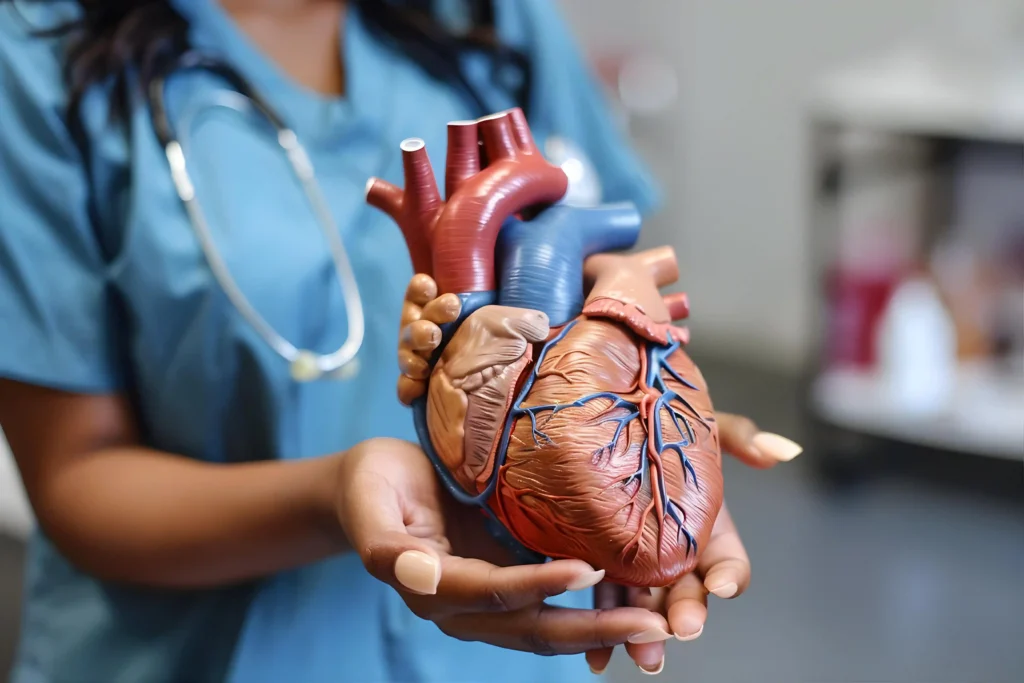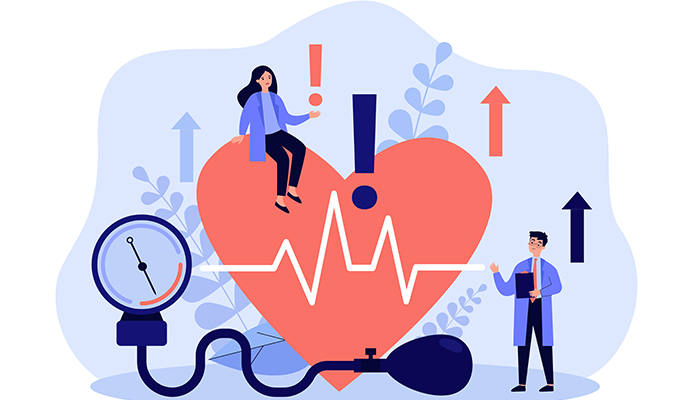Dr Garcia’s breakdown of healthy heart markers to watch
Wiki Article
Comprehending the Relevance of Cardiology in Modern Medical Care Providers
Cardiology plays a critical function in contemporary health care, particularly as heart problem proceeds to be the leading root cause of death worldwide. Advances in diagnostics and therapy have actually changed individual treatment, enabling earlier treatments and boosted results. In addition, the change towards preventive cardiology equips people to manage their health and wellness proactively. As innovation remains to evolve, the integration of cutting-edge options may even more redefine cardiology's influence on public health and wellness, triggering a closer exam of emerging patterns and their ramifications.The Prevalence of Cardiovascular Disease and Its Influence on Public Health And Wellness
Heart disease stays the leading cause of fatality globally, its impact prolongs much past private patients to influence public health systems and economic situations. The high prevalence of heart condition puts a significant stress on medical care resources, demanding increased funding for rehab, therapy, and prevention programs. Public wellness initiatives need to resolve danger factors such as excessive weight, smoking cigarettes, and sedentary lifestyles, which add substantially to the increasing occurrence of heart conditions.Moreover, the financial concern related to cardiovascular disease is immense, including not only straight clinical prices yet also indirect expenses associated with shed productivity and early death. Areas face challenges in taking care of these expenses, frequently resulting in variations in healthcare access and end results. As the populace ages and lifestyle-related dangers continue to intensify, the seriousness for effective cardiology treatments comes to be vital. As a result, addressing cardiovascular disease is not just an issue of private health however likewise a critical public health priority.Developments in Heart Diagnostics and Imaging Techniques
Recent developments in cardiac diagnostics and imaging strategies have revolutionized the area of cardiology, boosting the capacity to monitor and identify heart illness. Techniques such as cardiac MRI, CT angiography, and echocardiography have actually ended up being progressively advanced, giving in-depth pictures of heart frameworks and functions. These methods permit the very early identification of conditions like coronary artery illness, cardiac arrest, and valvular disorders.Moreover, developments in non-invasive diagnostics, such as wearable modern technology and remote monitoring tools, have encouraged individuals and healthcare service providers. These devices promote real-time tracking of heart rhythms and other vital signs, causing timely treatments. In addition, expert system is being incorporated into imaging evaluation, boosting precision and efficiency in diagnosis.Technologies in Therapy Options for Heart Issues
Recent innovations in cardiology have resulted in significant innovations in therapy options for heart disease. These include advanced medical techniques that enhance step-by-step outcomes and emerging medications that offer brand-new methods for treatment. As the field advances, these innovations play an important duty in enhancing client treatment and outcomes.Advanced Surgical Techniques
Technologies in surgical techniques have actually transformed the landscape of cardiology, using brand-new wish for individuals with heart disease. Minimally intrusive treatments, such as catheter-based treatments, have actually greatly reduced recovery times and medical facility keeps. Strategies like robotic-assisted surgical treatment boost precision, allowing cosmetic surgeons to navigate complex physiological structures with greater precision. Additionally, developments in imaging technology assist in real-time visualization throughout treatments, boosting end results. Transcatheter aortic shutoff replacement (TAVR) exhibits a breakthrough in treating aortic constriction, enabling valve replacement without open-heart surgical procedure. In addition, hybrid techniques that combine catheter-based and medical approaches offer customized services for various cardiac concerns. These advanced medical strategies not only improve individual security but also broaden treatment choices, underscoring the vital function of technology in modern cardiology practices.Arising Treatments and medicines
As the landscape of cardiology remains to advance, emerging therapies and drugs play a crucial function in improving treatment alternatives for heart problems. Advancements such as unique anticoagulants and progressed lipid-lowering representatives have actually changed the monitoring of cardiovascular diseases, significantly minimizing patient morbidity and mortality. Furthermore, the development of genetics treatments and regenerative medication uses promising methods for treating conditions formerly deemed incurable. Professional tests are consistently exposing the efficacy of these therapies, pushing the boundaries of traditional treatments. The combination of electronic health and wellness modern technologies facilitates personalized medicine, enabling for customized treatment plans based on hereditary and way of life elements. Jointly, these improvements emphasize the dynamic nature of cardiology, boosting person end results and redefining criteria of care in modern health care.The Duty of Preventive Cardiology in Client Treatment
Preventive cardiology plays an important function in individual care by concentrating on the identification of risk factors that contribute to heart condition. Via way of life adjustment strategies and early detection methods, doctor can properly reduce the incidence of cardiovascular events - Cardiologist near me. This proactive approach not just boosts patient end results however likewise advertises long-term healthDanger Variable Identification
While cardiovascular diseases continue to be a leading source of morbidity and mortality worldwide, reliable danger aspect identification functions as a keystone of precautionary cardiology. Determining danger variables such as high blood pressure, diabetic issues, household, and hyperlipidemia history is necessary for very early treatment. Health care experts use various evaluating approaches to evaluate these aspects, enabling for customized preventive procedures. In addition, understanding a person's way of life options, such as smoking and physical lack of exercise, better educates danger evaluations. This extensive evaluation makes it possible for medical professionals to establish personalized care plans targeted at mitigating threats. By focusing on risk factor recognition, medical care systems can improve patient end results and decrease the general concern of heart diseases, eventually adding to improved public health approaches and resource allotment.Way Of Living Modification Techniques
A multitude of researches highlights the vital duty of lifestyle adjustment approaches in lowering cardiovascular illness danger. These methods encompass nutritional adjustments, increased physical task, smoking cigarettes cessation, and weight management. By adopting a heart-healthy diet plan rich in fruits, vegetables, entire grains, and lean proteins, people can reduce cholesterol levels and blood stress. Normal exercise strengthens the heart and improves total cardio health and wellness. In addition, quitting smoking cigarettes substantially decreases the risk of cardiovascular disease and boosts healing rates for those with status quo. Weight management additionally adds to cardio health and wellness by alleviating various other danger variables such as diabetes and hypertension. Applying these way of living changes not only advertises specific well-being yet additionally functions as a foundation of preventive cardiology in client care.Early Discovery Techniques
Way of living adjustments considerably add to reducing heart disease dangers, you could check here but they are most effective when matched with very early detection techniques. Precautionary cardiology highlights the value of recognizing prospective heart problems prior to they escalate right into serious problems. Techniques such as blood pressure monitoring, cholesterol testing, and advanced imaging technologies like echocardiograms play important functions in evaluating cardiovascular health. Biomarkers and hereditary screening additionally boost the precision of very early detection, permitting for customized precautionary approaches. Regular heart risk examinations equip doctor to intervene proactively, browse around these guys potentially preventing cardiac arrest and strokes (Cardiologist near me). By integrating these very early discovery approaches right into regular care, patients can profit from prompt lifestyle interventions and targeted therapies, eventually boosting and enhancing end results lifestyleIntegrating Modern Technology Into Cardiology Practices
As advancements in innovation proceed to reshape numerous areas, the combination of cutting-edge devices and systems into cardiology techniques has actually ended up being essential for improving patient care and results. Telemedicine platforms allow cardiologists to keep an eye on patients from another location, improving accessibility to care while lowering the burden on medical care facilities. Wearable tools, such as smartwatches, allow continual heart rate surveillance, notifying both physicians and people to prospective problems in real-time. Furthermore, man-made knowledge (AI) is being used to analyze huge quantities of cardiac data, assisting in very early diagnosis and personalized treatment plans. Advanced imaging methods, consisting of 3D echocardiography, boost visualization of heart structures, bring about much more exact interventions. Digital health and wellness records (EHRs) simplify patient information monitoring, ensuring that cardiologists have immediate access to crucial data. Together, these technological developments are transforming cardiology, promoting proactive management and enhanced health and wellness outcomes for individuals with cardio conditions.The Importance of Patient Education and Involvement
Person education and interaction play an essential function in the monitoring of cardio health. By equipping clients with understanding concerning their problems, treatment alternatives, and lifestyle adjustments, doctor encourage individuals to take an active function in their care. This positive technique can cause boosted adherence to recommended medicines, nutritional modifications, and exercise programs, eventually minimizing the danger of complications.Engagement additionally promotes a strong patient-provider relationship, motivating open communication and depend on. When individuals really feel notified and included, they are more likely to voice problems and ask concerns, which can lead to much better scientific results. In addition, academic resources, such as workshops or electronic systems, can enhance understanding and advertise self-management techniques. On the whole, focusing on patient education and learning and involvement is vital for enhancing cardio health and wellness, improving lifestyle, and reducing health care prices connected with heart diseases.Future Fads in Cardiology and Their Possible Impact

Regularly Asked Questions
What Way Of Living Modifications Can Reduce Heart Problem Danger?
The present inquiry addresses way of life modifications that can considerably decrease cardiovascular disease threat. Cardiology. Embracing a balanced diet, taking part in normal physical task, preserving a healthy weight, handling stress and anxiety, and avoiding tobacco can notably boost cardiovascular health and wellnessJust How Can I Identify Very Early Indications of Heart Troubles?
Recognizing very early indicators of heart problems involves surveillance symptoms such as upper body discomfort, shortness of breath, tiredness, and uneven heartbeat. Prompt understanding of these signs can prompt essential clinical assessment and intervention for much better results.What Are the Distinctions Between Cardiologists and Heart Surgeons?
The distinctions in between cardiologists and heart doctors exist in their duties; cardiologists mainly diagnose and manage heart problems via non-invasive methods, while heart specialists execute operations to fix structural heart problems. Each plays a crucial, unique role.
How Usually Should I Get My Heart Health Checked?
The frequency of heart health checks differs based on individual danger aspects. Typically, grownups should go through examinations every one to 2 years, while those with current conditions might require more frequent evaluations as suggested by healthcare experts.What Duty Does Genes Play in Heart Disease Danger?
Genetics significantly influences heart disease threat, with domestic patterns indicating inherited problems. Details genetics can incline people to hypertension, cholesterol problems, and other cardio troubles, highlighting the value of genetic testing in evaluating heart wellness. Heart disease stays the leading reason of death around the world, its effect prolongs much past individual people to impact public health and wellness systems and economic situations. Public wellness campaigns must deal with threat elements such as weight problems, smoking cigarettes, and sedentary way of lives, which contribute substantially to the climbing incidence of heart conditions.Moreover, the economic problem connected with heart illness is tremendous, encompassing not only straight medical prices however likewise indirect costs connected to shed productivity and early death. Preventive cardiology plays a necessary function in individual care by concentrating on the recognition of danger aspects that contribute to heart condition. Fabricated intelligence (AI) and maker discovering are boosting diagnostics and client monitoring, enabling very early detection of heart diseases. The distinctions between cardiologists and heart specialists exist in their roles; cardiologists mainly manage and identify heart problems via non-invasive techniques, while cardiac doctors execute surgical treatments to fix structural heart issues.Report this wiki page